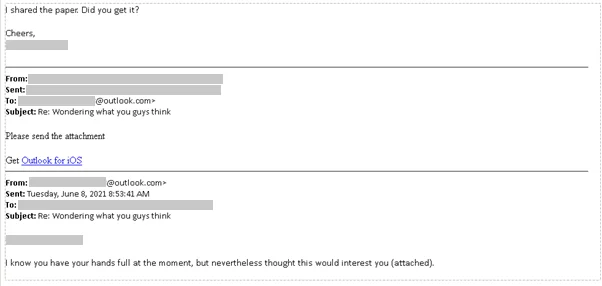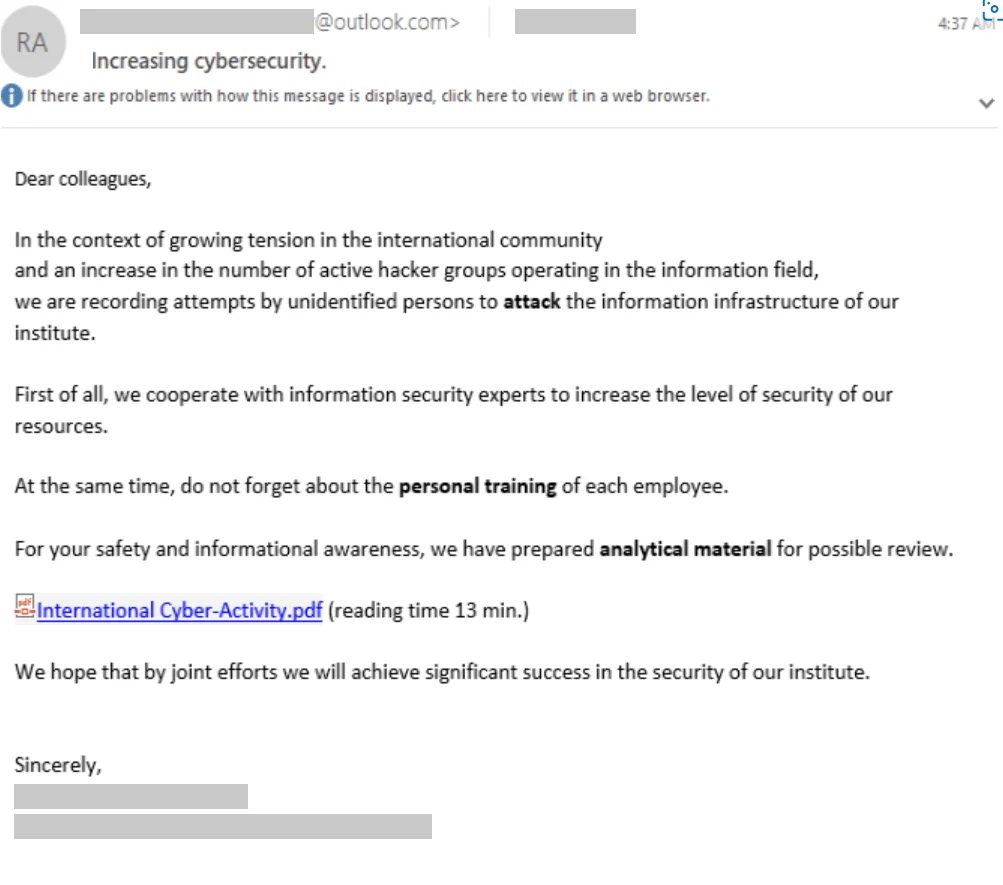Within the continuously changing cyber threat landscape, the strategies of Star Blizzard unfold with a calculated precision, resembling a strategic orchestration. Spear-phishing, in this context, mirrors a carefully planned and executed maneuver. This elusive group, exhibiting a level of sophistication comparable to seasoned experts, systematically identifies specific individuals and groups as their targeted audience.
 Threat actor card of Star Blizzard
Threat actor card of Star Blizzard
By skillfully employing information tailored to captivate their targets, Star Blizzard executes the intricate steps of a spear-phishing campaign to identify individuals believed to have direct access to valuable information or serve as gateways to coveted assets.
This sophisticated adversary has targeted specific entities within academia, defense, governmental organizations, NGOs, and think-tanks.
As Star Blizzard’s chilling maneuvers continue to unfold, the intricate dance of cyber warfare reveals a complex interplay of nation-state actors, each vying for supremacy in the ever-shifting landscapes of the cyber stage.
Who is Star Blizzard?
Star Blizzard, formerly recognized as SEABORGIUM and bearing alternative aliases like Callisto Group, TA446, COLDRIVER, TAG-53, and BlueCharlie, functions as a spear-phishing operation directly supported by the Russian government since 2019. This elusive group, akin to a digital phantom, employs a highly sophisticated approach that sets it apart in the realm of cyber threats.
 Fig. 1. Illustration of a Cyber Threat Group (Alwaba)
Fig. 1. Illustration of a Cyber Threat Group (Alwaba)
The threat actor Star Blizzard exhibits a meticulous approach, utilizing social media and networking platforms to thoroughly stalk their victims. Taking the time to understand their targets, they craft fake email accounts and social media profiles, even going to the extent of creating deceptive websites and fake event invitations. This careful groundwork allows them to impersonate close contacts or experts convincingly.
How does the Star Blizzard Attack?
The group primarily relies on spear-phishing emails sent to personal email addresses, occasionally leveraging corporate addresses. Consequently, this fundamental approach has become emblematic of their operations as the tactic allows them to avoid the security controls on corporate networks.
The trap set by Star Blizzard involves drawing victims into a conversation through common interests. Once a rapport is established, they strategically introduce malicious links, often disguised as familiar platforms like Google Drive or OneDrive.
Reconnaissance
Leveraging openly available resources for information gathering, Star Blizzard employs reconnaissance techniques that involve scouring social media and professional networking platforms. Through this method, the hacking group identifies entry points to engage their targets, investing time in studying their interests and discerning their real-world social or professional connections.
 Fig. 2. Threat Actor Gathering Information (Forbes)
Fig. 2. Threat Actor Gathering Information (Forbes)
In an effort to maintain an air of legitimacy, Star Blizzard fabricates email accounts that mimic those of recognized contacts within the target’s circle. Additionally, they craft deceptive social media and networking profiles, often posing as reputable experts. The group has been known to exploit the guise of conference or event invitations to lure their targets into their traps.
During their initial contact, Star Blizzard utilizes email addresses from various providers, such as Outlook, Gmail, Yahoo, and Proton Mail. These addresses are carefully selected to impersonate either known contacts of the target or well-established figures within the target’s specific field or sector.
In a bid to further enhance their credibility, the threat actors go the extra mile by creating malicious domains that closely resemble legitimate organizations, adding an additional layer of authenticity to their deceptive tactics.
Evasion
As their primary strategy involves infiltrating through phishing emails, they also adapt their evasion maneuvers in accordance with this tactic. The actors deliberately opt for personal email addresses as a strategic move to bypass the security measures implemented on corporate networks.
Trust-Forging Tactics
Star Blizzard invests significant effort in researching the interests and connections of their targets to construct an approach that appears legitimate. Subsequently, the group initiates the process of cultivating trust by establishing seemingly harmless contact. This initial interaction usually revolves around a topic carefully chosen to engage the targets. Notably, during this phase, Star Blizzard refrains from engaging in any malicious activities, focusing solely on building rapport with their targets.
 Fig. 3. Contact by Threat Actors (Microsoft)
Fig. 3. Contact by Threat Actors (Microsoft)
Once they are assured that the necessary rapport has been established, they proceed to launch their attacks. This method involves ongoing correspondence between the attackers and the targets, sometimes spanning an extended period to solidify the rapport.
The Delivery
After successfully building trust, Star Blizzard employs standard phishing techniques by sharing a link that seemingly directs the target to a document or website of interest. This link, however, leads to a server controlled by the attackers, coercing the target to input their account credentials.
The malicious link can manifest as a URL embedded in an email message, or the attacker might incorporate a link within a document hosted on platforms such as OneDrive, Google Drive, or other file-sharing services.
 Fig. 4. The Delivery of the Malicious File (Microsoft)
Fig. 4. The Delivery of the Malicious File (Microsoft)
In their spear-phishing endeavors, Star Blizzard utilizes the open-source framework EvilGinx, enabling them to harvest credentials and session cookies. This strategic use of EvilGinx proves effective in circumventing the protective measures of two-factor authentication.
Exploitation
Regardless of the chosen delivery method, when the target clicks on the malicious URL, they are redirected to a server controlled by Star Blizzard. This server replicates the sign-in page of a legitimate service. Any credentials entered on this deceptive page become compromised at this stage.
Subsequently, Star Blizzard employs the obtained credentials to gain unauthorized access to the target’s email account.
The actors have further utilized their access to a victim’s email account to extract mailing-list data and the victim’s contacts list. This acquired information is then exploited for subsequent targeted activities. Additionally, compromised email accounts have been employed by Star Blizzard for extended phishing campaigns.
 Fig. 5. Stages of Spear-Phishing (ManageEngine)
Fig. 5. Stages of Spear-Phishing (ManageEngine)
 Fig. 6. Illustration of Threat Actors, Targeting Intergovernmental Organizations
Fig. 6. Illustration of Threat Actors, Targeting Intergovernmental Organizations
(Created with Pixlr)
Target Countries:
Star Blizzard has orchestrated campaigns with a geographical emphasis on NATO countries, particularly the United States and the United Kingdom. However, the threat actor’s reach extends to other nations in the Baltics, the Nordics, and Eastern Europe. A notable instance involves targeting the government sector of Ukraine in the months leading up to the invasion by Russia. Despite engaging with organizations supporting the war in Ukraine, Microsoft’s assessment suggests that Ukraine may not be the primary focus for Star Blizzard; rather, it appears to be a reactive focus area within a broader array of diverse targets.
 Fig. 7. NATO Member Countries, Targeted by Star Blizzard (Wikipedia)
Fig. 7. NATO Member Countries, Targeted by Star Blizzard (Wikipedia)
Conclusion
Star Blizzard stands as a formidable cyber adversary, employing a sophisticated spear-phishing strategy to strategically target diverse sectors and geographies. With a pronounced focus on NATO countries, particularly the US and the UK, and a reactive interest in Ukraine during geopolitical events, the threat actor’s diverse range of targets includes defense companies, NGOs, IGOs, think tanks, and individuals with Russian affairs expertise. Vigilance is paramount for those previously targeted, as understanding Star Blizzard’s tactics is crucial for fortifying defenses against their persistent cyber threats. The upcoming section will provide essential security recommendations to safeguard against Star Blizzard’s multifaceted activities.
The next section will provide security recommendations to defend against Star Blizzard’s activities.
Recommendations: Guarding Against Star Blizzard
Defensive strategies are crucial for effectively avoiding the malicious activities of threat actors like Star Blizzard. In this context, individuals and organizations should not only implement comprehensive cybersecurity measures but also be diligent in identifying potential threat elements and cultivating awareness of cybersecurity threats. This is essential to adapt to the dynamic changes in the cybersecurity landscape and internalize a proactive stance against threats posed by entities such as Star Blizzard.
Phishing Awareness: Raise cyber threat awareness, recognizing that spear-phishing emails are meticulously crafted to evade suspicion. Verify the legitimacy of emails by scrutinizing sender addresses, especially when they deviate from typical corporate email addresses. Be cautious if an email is directed to your personal/webmail address rather than your corporate one, and validate the email’s authenticity through alternative means.
Password Creation: Utilize robust password practices by employing unique and strong passwords, particularly avoiding the reuse of passwords across various services.
Using MFA: Implement multi-factor authentication (MFA), also known as 2-factor authentication (2FA) or two-step verification, to mitigate the impact of potential password compromises.
Device and Network Protection: Safeguard your devices and networks by ensuring they are consistently updated with the latest supported versions. Promptly apply security updates, employ antivirus software, and conduct regular scans to fortify defenses against known malware threats.
Automated Email Scanning: Activate automated email scanning features provided by your email service providers, as these are typically enabled by default for consumer mail services. Check out our Email Threat Analyzer.
Mail Forwarding Rules: Disable mail-forwarding capabilities, as threat actors have been observed using this tactic to maintain visibility of target emails. Regularly monitor settings to ensure that external malicious actors have not established unauthorized mail-forwarding rules, or, if disabling is not feasible, take proactive measures to regularly assess and thwart potential forwarding rule setups by external entities.
Data Breach Protocols: Ensure that data breach protocols are in place and comply with legal and regulatory requirements pertaining to data exposure and leaks. For more information, you can visit our Account Breach Checker.
Notification Procedures: Establish procedures to notify affected parties and relevant authorities in the event of a data breach.
Utilize Threat Intelligence: Leverage cyber threat intelligence to gain insights into the Tactics, Techniques, and Procedures (TTPs) employed by Star Blizzard.
SOCRadar’s Insights: Utilize SOCRadar to stay abreast of the latest developments and threats posed by threat actors like the Star Blizzard Group, ensuring that defenses are continually updated and fortified against emerging threats.
 SOCRadar Threat Actor page
SOCRadar Threat Actor page
MITRE ATT&CK Tactic Table of Star Blizzard
TTP Table, as shared by NCSC:
|
MITRE ATT&CK Tactic |
MITRE ATT&CK Technique |
Description |
|
Reconnaissance |
T1593: Search Open Websites/Domains |
Star Blizzard uses open-source research and social media to identify information about victims to use in targeting. |
|
Reconnaissance |
T1589: Gather Victim Identity Information |
Star Blizzard uses online data sets and open-source resources to gather information about their targets. |
|
Resource Development |
T1585.001: Establish Accounts: Social Media Accounts |
Star Blizzard has been observed establishing fraudulent profiles on professional networking sites to conduct reconnaissance. |
|
Resource Development |
T1585.002: Establish Accounts: Email Accounts |
Star Blizzard registers consumer email accounts matching the names of individuals they are impersonating to conduct spear-phishing activity. |
|
Resource Development |
T1583.001: Acquire Infrastructure: Domains |
Star Blizzard registers domains to host their phishing framework. |
|
Resource Development |
T1586.002: Compromise Accounts: Email Accounts |
Star Blizzard has been observed using compromised victim email accounts to conduct spear-phishing activity against contacts of the original victim. |
|
Initial Access |
T1078: Valid Accounts |
Star Blizzard uses compromised credentials, captured from fake log-in pages, to log in to valid victim user accounts. |
|
Initial Access |
T1566.001: Phishing: Spear-phishing Attachment |
Star Blizzard uses malicious links embedded in email attachments to direct victims to their credential-stealing sites. |
|
Initial Access |
T1566.002: Phishing: Spear-phishing Link |
Star Blizzard sends spear-phishing emails with malicious links directly to credential-stealing sites, or to documents hosted on a file- sharing site, which then direct victims to credential-stealing sites. |
|
Defence Evasion |
T1550.004: Use Alternate Authentication Material: Web Session Cookie |
Star Blizzard bypasses multi-factor authentication on victim email accounts by using session cookies stolen using EvilGinx. |
|
Credential Access |
T1539: Steal Web Session Cookie |
Star Blizzard uses EvilGinx to steal the session cookies of victims directed to their fake log-in domains. For more information visit our blog. |
|
Collection |
T1114.002: Email Collection: Remote Email Collection |
Star Blizzard interacts directly with externally facing Exchange services, Office 365 and Google Workspace to access email and steal information using compromised credentials or access tokens. |
|
Collection |
T1114.003: Email Collection: Email Forwarding Rule |
Star Blizzard abuses email-forwarding rules to monitor the activities of a victim, steal information, and maintain persistent access to victim’s emails, even after compromised credentials are reset. |
Star Blizzard IoCs
|
Indicator |
Type |
Confidence |
Public References |
|
cache-dns[.]com |
Domain |
High |
|
|
cache-dns-forwarding[.]com |
Domain |
High |
|
|
cache-dns-preview[.]com |
Domain |
High |
|
|
cache-docs[.]com |
Domain |
High |
|
|
cache-pdf[.]com |
Domain |
High |
|
|
cache-pdf[.]online |
Domain |
High |
|
|
cache-services[.]live |
Domain |
High |
|
|
cloud-docs[.]com |
Domain |
High |
|
|
cloud-drive[.]live |
Domain |
High |
|
|
cloud-storage[.]live |
Domain |
High |
|
|
docs-cache[.]com |
Domain |
High |
|
|
docs-forwarding[.]online |
Domain |
High |
|
|
docs-info[.]com |
Domain |
High |
|
|
docs-shared[.]com |
Domain |
High |
|
|
docs-shared[.]online |
Domain |
High |
|
|
docs-view[.]online |
Domain |
High |
|
|
document-forwarding[.]com |
Domain |
High |
|
|
document-online[.]live |
Domain |
High |
|
|
document-preview[.]com |
Domain |
High |
|
|
documents-cloud[.]com |
Domain |
High |
|
|
documents-cloud[.]online |
Domain |
High |
|
|
documents-forwarding[.]com |
Domain |
High |
|
|
document-share[.]live |
Domain |
High |
|
|
documents-online[.]live |
Domain |
High |
|
|
documents-pdf[.]online |
Domain |
High |
|
|
documents-preview[.]com |
Domain |
High |
|
|
documents-view[.]live |
Domain |
High |
|
|
document-view[.]live |
Domain |
High |
|
|
drive-docs[.]com |
Domain |
High |
|
|
drive-share[.]live |
Domain |
High |
|
|
goo-link[.]online |
Domain |
High |
|
|
hypertextteches[.]com |
Domain |
High |
|
|
mail-docs[.]online |
Domain |
High |
|
|
officeonline365[.]live |
Domain |
High |
|
|
online365-office[.]com |
Domain |
High |
|
|
online-document[.]live |
Domain |
High |
|
|
online-storage[.]live |
Domain |
High |
|
|
pdf-cache[.]com |
Domain |
High |
|
|
pdf-cache[.]online |
Domain |
High |
|
|
pdf-docs[.]online |
Domain |
High |
|
|
pdf-forwarding[.]online |
Domain |
High |
|
|
protection-checklinks[.]xyz |
Domain |
High |
|
|
protection-link[.]online |
Domain |
High |
|
|
protectionmail[.]online |
Domain |
High |
|
|
protection-office[.]live |
Domain |
High |
|
|
protect-link[.]online |
Domain |
High |
|
|
proton-docs[.]com |
Domain |
High |
|
|
proton-reader[.]com |
Domain |
High |
|
|
proton-viewer[.]com |
Domain |
High |
|
|
relogin-dashboard[.]online |
Domain |
High |
|
|
safe-connection[.]online |
Domain |
High |
|
|
safelinks-protect[.]live |
Domain |
High |
|
|
secureoffice[.]live |
Domain |
High |
|
|
webresources[.]live |
Domain |
High |
|
|
word-yand[.]live |
Domain |
High |
|
|
yandx-online[.]cloud |
Domain |
High |
|
|
y-ml[.]co |
Domain |
High |
|
|
docs-drive[.]online |
Domain |
Moderate |
|
|
docs-info[.]online |
Domain |
Moderate |
|
|
cloud-mail[.]online |
Domain |
Moderate |
|
|
onlinecloud365[.]live |
Domain |
Moderate |
|
|
pdf-cloud[.]online |
Domain |
Moderate |
|
|
pdf-shared[.]online |
Domain |
Moderate |
|
|
proton-pdf[.]online |
Domain |
Moderate |
|
|
proton-view[.]online |
Domain |
Moderate |
|
|
office365-online[.]live |
Domain |
Low |
|
|
doc-viewer[.]com |
Domain |
Low |
|
|
file-milgov[.]systems |
Domain |
Low |
|
|
office-protection[.]online |
Domain |
Low |
The post Russian APT Operation: Star Blizzard appeared first on SOCRadar® Cyber Intelligence Inc..
Article Link: Russian APT Operation: Star Blizzard - SOCRadar® Cyber Intelligence Inc.
